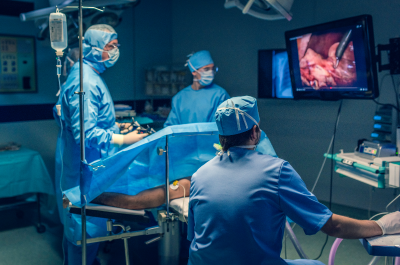Colorectal surgery is a specialized field of surgery that deals with the diagnosis and treatment of diseases affecting the colon, rectum, and anus. The field encompasses a wide range of conditions, including colorectal cancer, diverticular disease, anal fistula, anal fissure, hemorrhoids, inflammatory bowel disease, constipation, pelvic floor disorders, and cytoreductive surgery with HIPEC.
Colorectal cancer surgery is a key component of the management of colorectal cancer, which is the third most common cancer globally. The goal of surgery is to remove the cancerous tissue and surrounding lymph nodes while preserving bowel function and minimizing the risk of complications. Laparoscopic surgery, which involves the use of minimally invasive techniques and specialized instruments, has become the preferred approach for many colorectal surgeries, as it offers many advantages over traditional open surgery, such as smaller incisions, reduced pain and scarring, and faster recovery times.

Colorectal cancer screening is an essential tool in the early detection and prevention of colorectal cancer. Various screening methods are available, including colonoscopy, fecal occult blood testing, and stool DNA testing. The American Cancer Society recommends that individuals at average risk of colorectal cancer begin screening at age 45, while those at higher risk may need to start earlier and undergo more frequent screening.
Diverticular disease is a common condition that affects the large intestine and is characterized by the formation of small pouches or diverticula in the intestinal wall. Most people with diverticulosis, the asymptomatic form of the disease, do not require treatment. However, those with diverticulitis, which involves inflammation or infection of the diverticula, may require antibiotics or surgery. Bleeding is also one of the complications of diverticular disease. Treatment depends on the severity of the bleeding.
A fistula is an abnormal connection between two organs or structures in the body, most commonly between the skin and an internal organ. An anal fistula, also known as a fistula-in-ano, is a small tunnel that forms between the anal canal and the skin around the anus. The symptoms of an anal fistula can include pain or discomfort around the anus, swelling or redness around the anus, and drainage of pus or blood from the opening of the fistula. Some patients may also experience fever or chills if the fistula becomes infected. The treatment for an anal fistula typically involves surgery to remove the damaged tissue and create a new opening for drainage. Individualized treatment option is necessary for the best outcome.
An anal fissure is a tear or cracks in the lining of the anal canal. It can be caused by a variety of factors, including constipation, straining during bowel movements, and trauma to the anal area. The symptoms of an anal fissure can include pain or discomfort during bowel movements, itching or burning around the anus, bleeding during bowel movements, and a small tear or crack in the skin around the anus. The treatment for an anal fissure typically involves lifestyle changes and medication. Surgery is usually the last option of treatment.
Hemorrhoids are a common condition in which the veins in the lower rectum and anus become swollen and inflamed, causing pain, itching, and bleeding. Treatment for hemorrhoids may include lifestyle changes, medication, and surgery. Surgical options are also individualized for each patient.
Inflammatory bowel disease (IBD) is a chronic inflammatory condition of the gastrointestinal tract that includes Crohn's disease and ulcerative colitis. Treatment for IBD involves medication, surgery, and lifestyle changes, depending on the severity and extent of the disease. This disease is usually managed in combination with gastroenterologist.
Constipation is a common gastrointestinal problem that affects millions of people worldwide. It is characterized by infrequent bowel movements, difficulty passing stool, and abdominal discomfort. Treatment for constipation may involve dietary changes, exercise, and medication. It is important to know the cause of the constipation. Treatments includes dietary changes, exercise, bio feedback and medication.
Pelvic floor disorders refer to a group of conditions that affect the muscles and connective tissues that support the pelvic organs, such as the bladder, uterus, and rectum. Treatment for pelvic floor disorders may involve physical therapy, medication, and surgery.
Cytoreductive surgery with HIPEC is a specialized surgical technique used in the treatment of advanced abdominal cancers, such as pseudomyxoma peritonei and peritoneal mesothelioma. It is also done for other cancers with peritoneal metastasis. The procedure involves the removal of cancerous tissue and the administration of heated chemotherapy directly into the abdominal cavity, which can improve survival rates and quality of life for some patients.
In conclusion, colorectal surgery is a complex and evolving field that requires specialized training and expertise. With the development of new technologies and treatment modalities, colorectal surgeons continue to play a critical role in the diagnosis and management of a wide range of conditions affecting the colon, rectum, and anus. Colorectal Surgeons may offer the best treatment and outcome for the above diseases.
